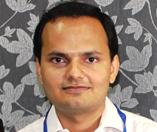KUMAR, Dr Pratyush
India - WoRSA inaugural chair
 Dr Pratyush KUMAR (India) is the inaugural chair of WONCA Rural South Asia (WoRSA)
Dr Pratyush KUMAR (India) is the inaugural chair of WONCA Rural South Asia (WoRSA)
What work do you do currently?
Currently I am in third year of my post graduate training in Department of Family Medicine at Sir Ganga Ram Hospital, New Delhi, India. I attend outpatient clinic, and visit our rural health centre as a primary care physician which is also a part of our training. Apart from my regular clinical and academic schedule as a post graduate trainee, I devote my extra time to primary care research. Currently I am working on Diabetes, HIV and infectious disease outbreaks like dengue and swine flu. I have also published and presented my research papers on the above subjects in peer reviewed indexed journals .
What other interesting activities have you been involved in?
If I have to choose one, it’s going to be WoRSA. WONCA Rural South Asia (WoRSA) is the group which was launched at the WONCA South Asia region conference in February 2016. This been the most exciting and interesting activity I have done so far. Rural health has always been close to my heart and definitely this has been the driving force behind choosing family medicine as my career.
Publishing research papers and being appreciated for work done is what makes us to do more quality research work in the future. Primary care research is something I am really interested in, as we don’t have much regional data on primary health care; mostly we supplement it with western data available which may not always be applicable. As the chair of WoRSA, I understand the need so to make the best out of it, so we have also undertaken a new initiative WoRSA – Primary care research (WoRSA –PCR). Our idea is to start multicentric research studies.
I have also developed an android app – WoRSA. We have few interesting plans to utilize this platform and disseminate our work and developments. We are going to start by featuring rural health success stories. We have also plans to keep all the presentations done as a part of rural CME as educational resources.
What are your interests as a family physician and what do you enjoy doing when you are not working?
As a family physician my area of interests are primary care research and developing a cost effective model using innovations like telemedicine, electronic medical records to provide an affordable and quality healthcare service in rural areas and also to keep a check on spending and wastage of resources. I have also presented a model to strengthen primary healthcare at the “Youth Leadership Summit – Primary Health Care” and was awarded the Youth ambassador award.
Apart from work it’s traveling, of which I am very fond. I feel it’s a learning experience when you travel abroad. You see a different world, experience different ways of living. Although I have travelled only to Istanbul and Colombo for conferences, I have learned a lot and would love to explore some other beautiful cities.
How did you come to be the new leader of WoRSA?
Rural health has always been my passion as I come from a small village in Bihar, in India, and have seen and experienced difficulties as a patient and now also as a primary care physician. Good history taking and clinical judgment are the only tools in the hands of rural physicians. Although with time, health care facilities have improved, it’s not enough to meet the growing demands of a rising population and nevertheless they incur huge out of pocket expenditure. Affordable, accessible and quality healthcare is the need of the hour.
The idea of WoRSA came during FMPC conference at New Delhi in 2015, in discussion with Dr John Wynn-Jones. He is an inspiring leader who supported and encouraged me. Dr Raman Kumar has been very kind and supportive towards this initiative. I worked on its basic principles and objectives and named it WoRSA. During the recent WONCA South Asia region conference we officially launched this group and also discussed rural health and the objectives of WoRSA, which was well received.
For a young doctor in his postgraduate training period to become a leader of WoRSA is the most exciting and interesting responsibility I would have ever asked for. It gives a platform to young, old and any family doctor interested in rural health to contribute and help us in reaching our goal of “positive health for all rural people”.
We are currently working on creating an online
rural health database, publishing quality research papers through our WoRSA – PCR forum, inspiring doctors through our WoRSA rural health success stories and campaign #4ruralheath in the pipeline.